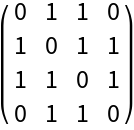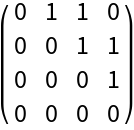Wolfram Function Repository
Instant-use add-on functions for the Wolfram Language
Function Repository Resource:
Compute the adjacency tensor of an arbitrary hypergraph
ResourceFunction["AdjacencyTensor"][h] gives the vertex adjacency tensor of the (ordered or orderless) hypergraph h. |
| "OrderedHyperedges" | False | whether to treat hyperedges as being ordered (directed) |
The adjacency tensor of an orderless hypergraph, with hyperedges of arity 3:
| In[1]:= | |
| Out[1]= | |
| In[2]:= | |
| Out[2]= | |
The adjacency tensor of an ordered hypergraph, with hyperedges of arity 3:
| In[3]:= | |
| Out[3]= | |
| In[4]:= | |
| Out[4]= | |
The adjacency tensor of an orderless hypergraph, with hyperedges of arity 5:
| In[5]:= | |
| Out[5]= | |
AdjacencyTensor supports multihypergraphs, in which case the tensor entries represent hyperedge multiplicities:
| In[6]:= | |
| Out[6]= | |
| In[7]:= | |
| Out[7]= | |
When the arity of hyperedges is equal to 2, the output of AdjacencyTensor is identical to the output of AdjacencyMatrix:
| In[8]:= | |
| Out[8]= | |
| In[9]:= | |
| Out[9]= | |
| In[10]:= | |
| Out[10]= | |
The adjacency tensor of an orderless hypergraph is always symmetric across all indices:
| In[11]:= | |
| Out[11]= | |
| In[12]:= | |
| Out[12]= | |
The adjacency tensor of an ordered hypergraph is not necessarily symmetric across all indices:
| In[13]:= | |
| Out[13]= | |
| In[14]:= | |
| Out[14]= | |
The adjacency tensor of a hypergraph with self-loops has diagonal entries:
| In[15]:= | |
| Out[15]= | |
| In[16]:= | |
| Out[16]= |  |
| In[17]:= | |
| Out[17]= | |
Hyperedges can be of arbitrary arity:
| In[18]:= | |
| Out[18]= | |
By default, all hyperedges are treated as orderless (i.e. undirected):
| In[19]:= | |
| Out[19]= | |
| In[20]:= | |
| Out[20]= |  |
Use "OrderedHyperedges"→True to treat hyperedges as ordered (i.e. directed):
| In[21]:= | |
| Out[21]= | |
| In[22]:= | |
| Out[22]= |  |
This work is licensed under a Creative Commons Attribution 4.0 International License